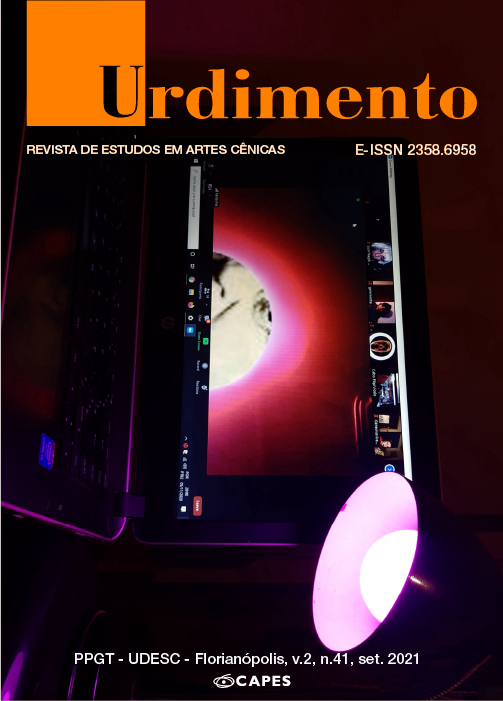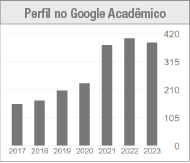A Nova Mulher: Inquietações masculinas e burlas femininas no cabaré berlinense
DOI:
https://doi.org/10.5965/1414573102412021e0105Palavras-chave:
Nova Mulher, Cabaré, Tipificações, República de WeimarResumo
A Nova Mulher foi um fenômeno complexo, multidimensional, heterogêneo e gradual que alcançou expressão na Alemanha durante a República de Weimar. O direito à participação feminina na política, garantido pela Constituição de 1919 e o afluxo de mulheres no mercado de trabalho geraram tensões masculinas acerca dos papéis de gênero. O cabaré, enquanto um gênero comentador de seu tempo, trouxe para a cena as ansiedades geradas pela Nova Mulher, representando-a através de tipificações. Este artigo pretende analisar algumas destas tipificações - indício das inquietações masculinas - em contraponto às estratégias femininas para burlá-las.
Downloads
Referências
ANKUM, K. VON (org). Women in the metropolis: gender and modernity in Weimar culture. Berkeley: University of California Press, 1997. kindle edition
APPIGNANESI, Lisa. Cabaret the first hundred years. London: Methuen, 1984.
BAILEY, Peter. Conspiracies of Meaning: Music-Hall and the Knowingness of Popular Culture. The past and present society magazine. No. 144 (Aug, 1994), p. 138-170.
BOAK, Helen. Women in the Weimar Republic. Manchester: Manchester University Press, 2013.
BRECHT, Bertolt. The Messingkauf Dialogues. London: Methuen, 1994.
COHEN, Renato. Performance como linguagem: criação de um tempo-espaço de experimentação. São Paulo: Perspectiva, 2002.
DANIELCZYK, Sandra. Diseusen in der Weimarer Republik: Imagekonstruktionen im Kabarett am Beispiel von Margo Lion und Blandine Ebinger. Bielefeld: Transcript Verlag, 2017.
DOUBLE, Oliver; Wilson, Michael. Brecht and Cabaret. In: THOMPSON, Peter; SACKS, Glendyr. The Cambridge Companion to Brecht. Cambridge: Cambridge University Press, 2006.
FARINA, Willian. The German cabaret legacy in American popular music. Jefferson: McFarland & Company, Inc, 2013.
FECHNER, Charlotte. The Berlin Cabaret & the Neue Frau 1918-1933. München: GRIN Verlag, 2001.
FERRAN. Peter Wigglesworth. The Threepenny Songs: Cabaret and the Lyrical Gestus. Theater, Volume 30, Number 3, Fall 2000, pp. 5-21
GILL, Anton. Dance Between Flames: Berlin Between the Wars. Londres: Endeavour Press, 2015. Kindle Edition.
GORDON, Mel. Voluptuous panic: the erotic world of Weimar Berlin. Los Angeles: Feral House, 2006
GRAF, Rüdiger. Anticipating the Future in the Present: "New Women" and Other Beings of the Future in Weimar Germany. Central European History, vol. 42, no. 4, p. 647–673, 2009.
HAKE, Sabine. In the mirror of fashion. In: ANKUM, Katherine von (org). Women in the metropolis: gender and modernity in Weimar culture. Berkeley: University of California Press, 1997. kindle edition
LEWIS, Beth Irwin. Lustmord: inside the Windows of the Metropolis. In: ANKUM, Katherine von (org). Women in the metropolis: gender and modernity in Weimar culture. Berkeley: University of California Press, 1997. kindle edition
MAFESSOLI, Michel. O imaginário é uma realidade. Revista FAMECOS, Porto Alegre, nº 15, p.74-83, agosto, 2001.
MIZEJEWSKI, Linda. Divine Decadence: Fascism, Female Spectacle, and the Makings of Sally Bowles. Princeton: Princeton University Press, 2014, p.44
PAVIS, Patrice. Dicionário de Teatro. São Paulo: Perspectiva, 2008.
RICHARD, Lionel. Berlim, 1919-1933: a encarnação extrema da modernidade. Rio de Janeiro: J. Zahar, 1993.
RICHIE, Alexandra. Faust’s Metropolis: a history of Berlin. London: William Collins, 2013. Kindle Edition.
RUTTKOWSKI, Wolfgang. Cabaret Songs. Popular Music & Society, 25:3-4,
-71, 2001.
SCHASER, Angelika. Gendered Germany. In: RETALLACK, J. N. (ED.). Imperial Germany, 1871-1918. New York: Oxford University Press, 2008.
SCHMID, Carol. The 'New Woman' Gender Roles and Urban Modernism in Interwar Berlin and Shanghai. Journal of International Women's Studies, 15(1), 1-1, 2014.
SIEG. Katrin. Exiles, Eccentrics, Activists: Women in Contemporary German Theater. Ann Harbor: The University of Michigan Press, 1997.
SIMMEL, George. A Metrópole e a Vida Mental. In: VELHO, Otávio G (org.). O Fenômeno Urbano. Rio de Janeiro: Ed. Guanabara, 1973.
STREVA, Christina. Por um ator-provocador e um professor-criador: uma pesquisa-ação sobre a performance de cabaré. Tese (Doutorado) – Universidade Federal do Estado do Rio de Janeiro, Rio de Janeiro, 2017.
SUTTON, Katie. The Masculine Woman in Weimar Germany. New York: Berghahn Books, 2011.
TURNER, Victor. O processo ritual: estrutura e antiestrutura. Petrópolis: Vozes, 2013.
WIDDIG, Bernd. Culture and inflation in Weimar Germany. Berkeley: University of California Press, 2001.
Downloads
Publicado
Como Citar
Edição
Seção
Licença
Copyright (c) 2021 Urdimento - Revista de Estudos em Artes Cênicas

Este trabalho está licenciado sob uma licença Creative Commons Attribution 4.0 International License.
Declaração de Direito Autoral
Os leitores são livres para transferir, imprimir e utilizar os artigos publicados na Revista, desde que haja sempre menção explícita ao(s) autor (es) e à Urdimentoe que não haja qualquer alteração no trabalho original. Qualquer outro uso dos textos precisa ser aprovado pelo(s) autor (es) e pela Revista. Ao submeter um artigo à Urdimento e tê-lo aprovado os autores concordam em ceder, sem remuneração, os seguintes direitos à Revista: os direitos de primeira publicação e a permissão para que a Revista redistribua esse artigo e seus meta dados aos serviços de indexação e referência que seus editores julguem apropriados.
Este periódico utiliza uma Licença de Atribuição Creative Commons– (CC BY 4.0)




